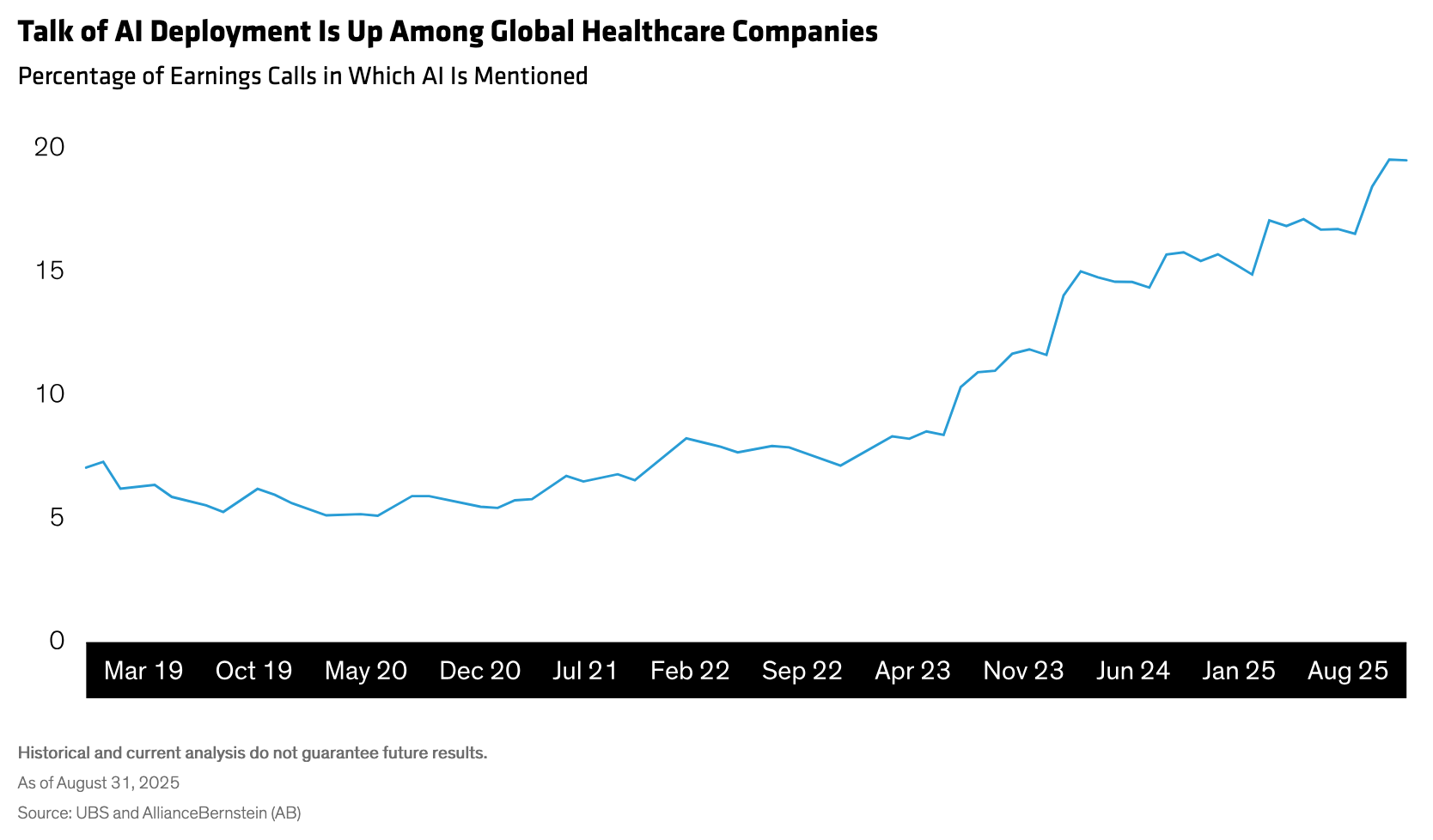by Vinay Thapar, CFA, & Jane Bleeg, AllianceBernstein
AI is a potential boon to healthcare companies, but business fundamentals—not the latest science—are the true test of staying power.
Healthcare businesses are harnessing a new catalyst for growth that should give investors reason for optimism despite the sector’s weakness this year. Artificial intelligence (AI) applications across the healthcare sector are creating an innovative force that can fuel earnings—and equity return potential—for select companies.
Technology advancement has always been a change agent for healthcare, which heavily relies on data management and better science for its bread and butter. AI is the next wave, from faster drug approvals and better patient experiences to robot surgeons and cancer-detecting arm patches. The topic of AI is being raised more often by healthcare companies (Display), though only a relatively small portion of the sector is actively pursuing applications for the technology. We see AI as a driver of differentiation, leading to greater business success, growth and equity return potential in the coming years.
Strong Vital Signs of AI’s Emerging Force
AI has already forged a path solving healthcare’s crucial need for information gathering and exchange. OpenEvidence, an AI-powered data source dedicated to healthcare professionals, is quickly becoming the OpenAI of the medical profession.
Prompted by a few typed questions, the platform aggregates, visualizes and disseminates responses from its growing library of gold-standard medical literature and academic research—all vital to making well-informed decisions.
Early Success with AI-Driven Medical Procedures
The idea of R2-D2 performing major operations on live patients takes time to process. But efforts to advance robotic surgery—without human assistance—are breaking new ground. Researchers at Johns Hopkins University, for instance, used comprehensive teaching videos to train robots on gallbladder surgery using life-like patients, and achieved a 100% success rate across eight trials. It marked “a milestone toward clinical deployment of autonomous surgical systems,” according to an abstract of the study published in Science Robotics in July.
One healthcare company, Intuitive Surgical, is well out of the gate on this. With its solid business model, Intuitive has led in robotic-assisted surgical machinery and data generation services. We believe AI is likely to add another impetus to its technology offerings, potentially transforming the entire surgical process from patient selection to recovery.
Outsmarting Viruses and Smartly Managing Clients
AI could also help accelerate drug discovery, genomics (DNA) studies and clinical research. To be sure, successes have been limited to date. The Financial Times recently reported that expectations of a revolution in reducing drug discovery failure rates were overstated and few AI-discovered drugs have reached late-stage clinical trials.
Still, some companies are leveraging advanced analytics and digital twin (virtual model) technology to simulate disease progression, optimize molecules and customize individual therapies. For example, in vitro diagnostic specialist bioMérieux uses AI to advance its clinical antimicrobial resistance detection, infectious disease testing and COVID-19 surveillance.
Commercial uses for AI in healthcare have made strides, too. Veeva Systems, a life-science cloud software provider, is using AI to streamline clinical trial management and regulatory compliance for pharmaceutical companies.
A Good Bedside Manner: AI’s Human Experience
Some still view AI as a threat, especially to their jobs. But it might just save their lives them without realizing it. GE HealthCare, for example, turns to AI to take sharper X-rays in less time, improving image quality and the potential for more accurate diagnosis while shrinking overall radiation exposure.
AI has also helped deliver new cures and treatments into patients’ hands faster. For example, it’s behind the invention of ultrasound patches that allow people to detect or monitor cancer cells in the comfort of their home. Another potential benefit for patients: helping specialists communicate better in a fragmented healthcare landscape. Imagine a complex case in which AI enables a conversation between a nephrologist, cardiologist and endocrinologist, leading to a faster diagnosis and response that helps the patient avoid the hospital. That’s a better outcome for patients, which can also reduce costs for the industry.
Evaluating the AI Surge in Healthcare
While AI will improve many aspects of the healthcare industry, it’s important that investors focus on its true benefits to the individual business. It’s smart to put cash to work with a promising innovation, but one can’t assume it’ll single-handedly transform a company with bigger problems.
That’s why we always stress that healthcare investors focus on the business, not the science. The same logic has applied to other breakthroughs, from the dawn of the internet to drug and vaccine development. Even the most successful disruptive technology is built on many failures along the way. And sometimes it takes time for even the best-laid ideas to catch on.
In our view, investors in healthcare stocks must pay attention to how AI contributes to a company’s business model, along with cash flow, profitability and competitive position. Also consider if the business is durable and whether it’s reinvesting above the cost of capital. A sound business can still thrive if an AI venture fails. And if a healthcare business model is truly top quality, AI success will only strengthen it—fostering better outcomes for earnings and investors.














